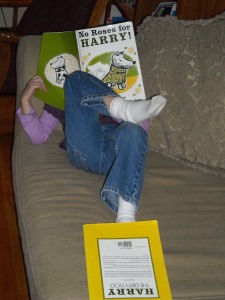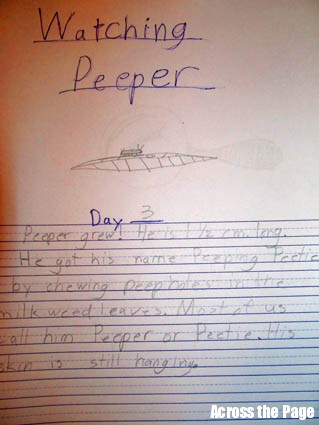Cultivating Young Writers
Last week at a homeschool gathering, I found myself between two mothers who were discussing writing curriculum. Neither of them knew I have an advanced degree in English, have taught at several colleges, and teach now in a local community college. I sat quietly while they discussed what “should” be done for a young writer — I believe in first or second grade — who had finished the first level of a popular structured writing curriculum.
I’m not sure what I would have said if they’d asked me for input. But I’m always a little uncomfortable when I hear homeschoolers comparing curricula as though their children’s writing lives depend on making the right choice.
All I could have done is describe what I did with my own children, one of whom is in college, one of whom is in high school, and both of whom are excellent writers. My youngest has a strikingly distinctive voice and can even write convincing dialogue — something I’ve never been able to pull off myself!
What I did with them bears little resemblance to what I do in the college classroom, despite my consistent belief in writing as a process, one that is learned by doing, and one that can generate tremendous stress. In the classroom, for instance, I assign prewriting activities, do first drafts and peer reviews, and provide lots of scaffolding for all stages of a writing project over a period of weeks. Yet for my daughters, I did almost none of this.
Early on, I read that children’s fine motor skills are such that handwriting itself can pose an obstacle when it comes to capturing thoughts on paper. So though they learned handwriting, we used narration to assess their understanding of history, science, stories, and so on. They would dictate a summary, and I would write it down. They became expert summarizers, I can tell you that! And as their handwriting skills developed, they took over and wrote for themselves. I remember that by late elementary school, my oldest would make outlines of sermons on Sundays. She’d gotten pretty good at recognizing the thought structure of a reading or a sermon, and she kept a notebook of them.
At different times through the years, I tried various structured approaches. Susan Wise Bauer advocated dictation and copywork, so we did some of that. We tried a couple of vocabulary courses. The most consistent curricula was Rod and Staff, a heavily grammar-focused series of English texts published by Mennonites. The girls learned to diagram sentences and label parts of speech far beyond what I learned in school.
But none of these things taught them to write, I don’t think. They provided some structure and support, but I think the main secret was that we lived in an atmosphere of words and stories and verbal expression. We read aloud to the girls, when they were very small and on into later years. We listened to audiobooks — in the kitchen, in the car, in their rooms, everywhere. We quoted lines of dialogue or description at random (it’s amazing how often a quotation is relevant to what’s happening). We bought them fancy notebooks, and they kept journals and wrote stories of their own.
How did they become writers? It just happened. It wasn’t something I taught them methodically from the bottom up. Writing grew naturally, and the educational materials provided some structure and language.
So I guess I would say, had those mothers asked, that I believe writing can grow from the natural impulse we all have to capture and communicate our inner worlds. We can surround our kids with the sound of good writing that connects and expresses and probes and develops and conveys the heart’s experience. The most important thing is not to get in the way of their enjoyment and satisfaction in expressing themselves. (I’m actually surprised that Rod and Staff didn’t get in the way, but I think this was because it was seen, by the girls and by me as well, as a different subject altogether than writing.)
If I had it to do over again, would I do it all the same way? I would definitely preserve the strengths of literacy in the atmosphere, and staying out of the way. But I doubt that anyone could get to the end of a sprawling, 15-year project and say it was all perfect! If I had it to do over again, I would probably spend less time with Rod & Staff, and more time creating engaging writing projects that relate to other things we’re doing, and that allow for all stages of the writing process. I’d try to find ways to provide more reader feedback, and different scenarios that would help make the idea of audience more real and important in how writing takes shape. And I’d save the attention to mechanics for where it belongs, in the editing phase, rather than leaving it as its own parallel universe.
But when all is said and done, my daughters are testimony to the fact that good writers can emerge without “perfect” (or even totally consistent!) teachers, curricula, or methodology. There are many recipes. Writing can be a natural outgrowth of the way we’re made: beings who understand the world and form connections with each other through words, and we long to be heard.








2 Comments
Ruth
Such a terrific post, and I agree with you so strongly that that is how writers develop. A household full of words is a great gift to anyone!
Janet
Thanks, Ruth! I don’t take this lightly, since you and your husband are known forever in my family as “the people who beat Janet at Boggle”! :-)
Seriously, I’m glad we’re on the same page. I know your household is a very rich environment for thought and expression!